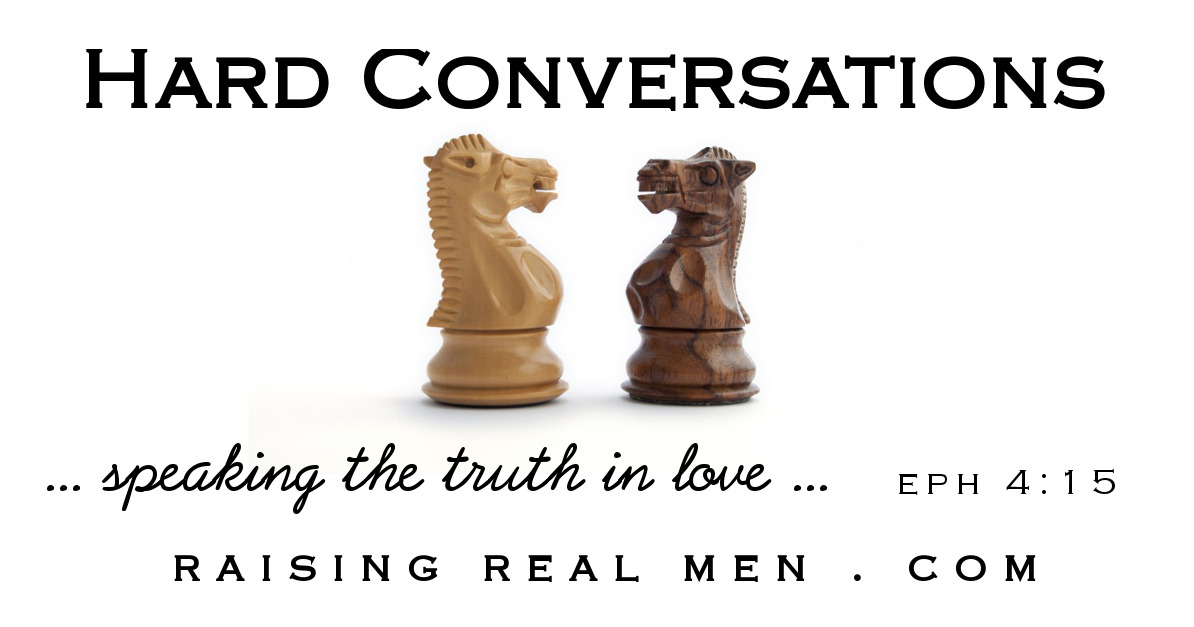Hard Conversations
Hal had a friend in college that he’d known for many years. Like good friends do, they shared a lot of interests, opinions, and experiences in common. Yet an unexpected break happened – the friend made some lifestyle changes that Hal was uncomfortable about. At the time, they seemed like a really big deal, and Hal didn’t want to be arguing with his friend … so he avoided confrontation by just avoiding conversations with him. And naturally enough, the close friendship ended!
He regrets it to this day. It was so avoidable, and the issues really weren’t that important after all. But this illustrates a powerful fact – relationships are built on communication, and sometimes you need to talk about unpleasant things together if you want to continue that relationship.
Sometimes love means a tough conversation
In Matthew 22:39, Jesus told an inquirer that the second great commandment is “You shall love your neighbor as yourself.” He was quoting the end of an interesting passage in Leviticus, where the Lord told Moses to instruct the people:
“You shall not hate your neighbor in your heart. You shall surely rebuke your neighbor and not bear sin because of him. You shall not … bear any grudge against the children of your people, but you shall love your neighbor as yourself …” (Leviticus 19:17-18)
The apostle Paul said that love doesn’t allow itself to become resentful and irritable, or keep track of every wrong that’s suffered (1 Corinthians 13:5). You can either totally forgive the offense and completely overlook it, or you can have the talk with your friend, but you don’t save it up and brood over it.
And that doesn’t have to rise to the level of sinful offenses – it may be a simple as an irritating habit or a thoughtless behavior.
Right time, right way
There are a few things to keep in mind, though.
Paul says that the believer’s conversation needs to be honest and factual – but moderated by love (Ephesians 4:15).
And Jesus’ instructions in Matthew 18 tell us, “If your brother sins against you, go and tell him his fault between him and you alone. If he hears you, you have gained your brother.” So this sort of rebuke needs to be private.
It needs to be thoughtful and deliberate. “A fool takes no pleasure in understanding, but only in expressing his opinion.” (Proverbs 18:2) We have to leave space for the possibility that our friend’s offense isn’t intentional or malicious. That’s why we plan to have a discussion, not an accusation and arraignment.
And it needs to be calm. “Let every man be swift to hear, slow to speak, slow to wrath, for the wrath of man does not produce the righteousness of God.” (James 1:19-20) The Holy Spirit’s work is so much more effective than our bluster and rage when trying to reach someone’s heart for a positive change!
Are we teachable, ourselves?
Which brings up a final point. If a friend shares a grievance or offense with us, are we “swift to hear” as James says? Do we desire understanding, like the proverb recommends, or are we quick on the draw to defend our own position?
Solomon observed that “Open rebuke is better than love carefully concealed. Faithful are the wounds of a friend …” (Proverbs 27:5-6)
None of us is perfect, and we all have blind spots. A gentle word from someone you trust could make a real difference in your life, if you’re willing to let it. Assume they mean well when they come to you with some matter or other. Wouldn’t it be better to know the truth from a friend than be caught by surprise?
And isn’t it more loving, in the end, to have the conversation which might lead to change, improvement, and restoration … than to avoid confrontation by cutting off the relationship altogether? Don’t say to yourself, “I like this person too much to risk a disagreement, so I’ll just kill the relationship instead.”
Isn’t it worth discussing?
 |
Yours in Christ, Hal and Melanie |
|
Like to hear more? Check out our podcast, Making Biblical Family Life Practical |
 |
